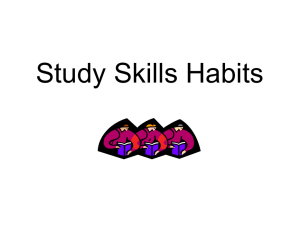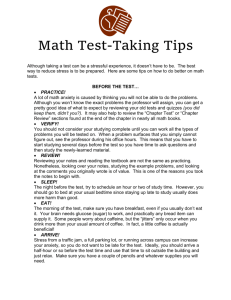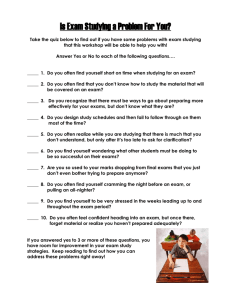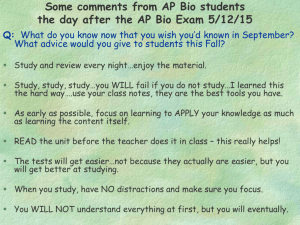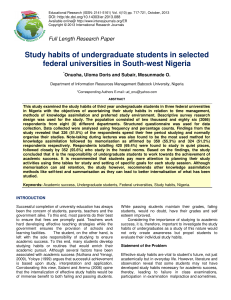studying math effectively
advertisement
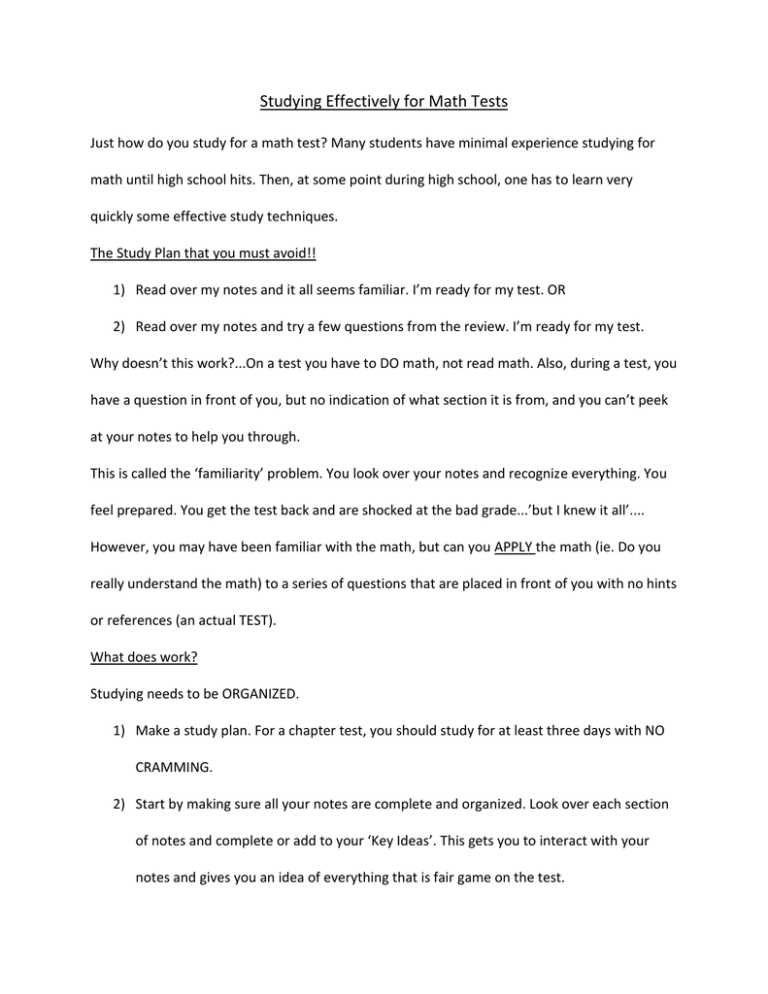
Studying Effectively for Math Tests Just how do you study for a math test? Many students have minimal experience studying for math until high school hits. Then, at some point during high school, one has to learn very quickly some effective study techniques. The Study Plan that you must avoid!! 1) Read over my notes and it all seems familiar. I’m ready for my test. OR 2) Read over my notes and try a few questions from the review. I’m ready for my test. Why doesn’t this work?...On a test you have to DO math, not read math. Also, during a test, you have a question in front of you, but no indication of what section it is from, and you can’t peek at your notes to help you through. This is called the ‘familiarity’ problem. You look over your notes and recognize everything. You feel prepared. You get the test back and are shocked at the bad grade...’but I knew it all’.... However, you may have been familiar with the math, but can you APPLY the math (ie. Do you really understand the math) to a series of questions that are placed in front of you with no hints or references (an actual TEST). What does work? Studying needs to be ORGANIZED. 1) Make a study plan. For a chapter test, you should study for at least three days with NO CRAMMING. 2) Start by making sure all your notes are complete and organized. Look over each section of notes and complete or add to your ‘Key Ideas’. This gets you to interact with your notes and gives you an idea of everything that is fair game on the test. 3) Go back to the first section in your notes and read the main concepts/ideas over. Cover the examples in the notes and do them over. If you struggle with one or more of them, find a similar question in that assignment and try one or two more. Then go to the review assignment and pick some questions from that section for a practice test that you will take later. Do this for the other sections included on the test. 4) If you do step 3 over the course of two days, do a brief review (10 minutes) of what you studied on Day 1 before moving on to the sections you will study on day 2. 5) On the last day, start by making an ‘CHEAT SHEET’, a sheet that would be useful to you if you could take it into your test (you can’t though). Go through each section and write down all the important points (try to do it without looking at the notes). For example, if you are learning about graphing quadratic functions, write y=a(x+p)2+q and describe how a, p, and q alter the parabola. Then look over your notes to see if you missed something, or if you forgot something. You’ll be surprised at how good an exercise this is to solidify your learning. You’ll know everything on your cheat sheet and wouldn’t even need it anyway! 6) Do your practice test that you were picking questions for as you went through each section. Pay attention to the instructions of the questions to get used to the vocabulary (it will be similar vocabulary on the test questions). Try to recognize what section it is from to give it a context. Check the answer in the back of the text to see if you did it right. If so, great! If not, then go through it closely, possibly with the applicable notes available, and try to figure out your mistake(s) so you avoid them the day of the test. Then try to find another question like that one so you can try again. The six steps above are a good guide on how to study for math. Students may not do exactly what is suggested above, but it should be similar. What components are essential to doing well? What does your studying need? A) An organizational system that ensures you’ve studied THOROUGHLY, ie did you address everything that could possibly be on the test. B) You need to DO math to study, not simply READ or look over the math. C) Your studying should definitely include a test simulation...a practice test that you make up to see if you’re really prepared. D) Extra work on concepts/questions that are troublesome. E) More than one day. Cramming does not work for most people, as all the math runs together. If you find you need extra help, you have the time to get it. Another Helpful Tip Listen closely to what your teachers says leading up to a chapter test. There are usually one or more hints about what will be on the test. Write these down and pay attention to them while studying. What are your goals? Pre-Calculus 11 is a proportionally tougher course for grade 11s than FOM 10 was in grade 10, than Math 9 was in grade 9. This is because Pre-Calculus 11 is NOT the ‘regular’ math 11. It is a challenge course for students entering math, science, or engineering in post secondary. What may have worked for students in the past to get an ‘A’ (familiarity studying, night-before studying) will not work for most students in this course. To get a great mark in this course, your study habits have to improve. And why shouldn’t they, with post-secondary fast approaching! I have had conversations with many students wondering why they don’t have an ‘A’ in this course because they are usually an ‘A’ student. This course is tough. Many of the students who typically get ‘A’s in all of their other courses will not automatically get an ‘A’ in Pre-Cal. It takes a commitment to working very hard, and learning to employ better study habits. Even then, some students will not reach ‘A’ level. However, what Pre-Cal is, is a very challenging learning experience that will hopefully help you become better at thinking your way through problems, improve your logical reasoning, sharpen your study habits and become a better self-learner in general. Do you have the motivation, the drive, to go for an ‘A’ in this course? It won’t just be handed to you. How hard are you willing to work for it? Do you have the courage to change your study habits for it, even though it will mean more time, thought, and energy? Test Anxiety Test anxiety is a problem some students have to learn to deal with and improve. I highly recommend searching this topic on the internet. There are many techniques students can use to help alleviate anxiety. There is not one way that works for everyone so it’s up to a student to try a variety of things and find what works for them. Tests will be a reality for students in high school and post-secondary, so it is something that students must actively and constructively learn to deal with. Last (Difficult) Thoughts Now, I have to say something tough here… and this is after seeing and talking to hundreds of students over the years… anxiety cannot take a student who really knows the material and make him/her completely fail a test. I’ve talked to MANY students who, upon failing a test, tell me that they “really knew the material” but just got nervous and blanked out. After doing a little digging, it always turns out that they really didn’t know the material as well as they thought they did. This is usually due to the ‘familiarity’ problem I talked about earlier (poor study habits). They looked over their notes and homework and it all looked familiar. So, they made the assumption that they knew the stuff. But, looking at completed problems is very different than looking at unanswered test questions that aren’t in the same order as they appear in the book. Don’t blame a lack of success on other factors before you look into the mirror yourself. Are you doing all you can to do your best? Yes, there may be other things that are hindering your progress, BUT, are YOU doing all YOU can to do your best? Most times, the answer to that question is no. So what can YOU do, what is within YOUR control to change that? Are you doing all you can to improve? If you hand off the power to improve to other factors, then you’re losing the control to improve. Take ultimate responsibility for your learning

